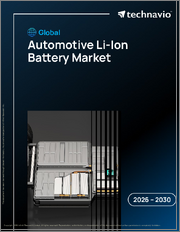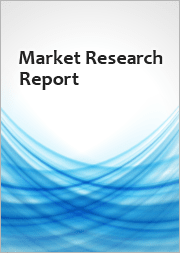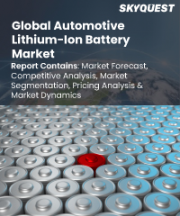
|
시장보고서
상품코드
1642530
리튬이온 배터리 시장 보고서 : 제품 유형별, 출력 용량별, 용도별, 지역별(2025-2033년)Lithium-ion Battery Market Report by Product Type, Power Capacity, Application, and Region 2025-2033 |
||||||
세계 리튬이온 배터리 시장 규모는 2024년 540억 달러에 달했습니다. 향후 IMARC Group은 2033년까지 시장이 1,405억 달러에 이르고, 2025년부터 2033년까지 11.14%의 성장률(CAGR)을 나타낼 것으로 예측했습니다. 이 시장은 주로 전기자동차(EV) 수요 증가와 신재생에너지 저장 솔루션의 급속한 확대로 큰 성장을 이루고 있습니다. 이에 따라 배터리의 효율과 용량을 향상시키는 기술적 진보가 소비자 일렉트로닉스에의 제품 채용의 확산과 함께 시장 성장을 더욱 뒷받침하고 있습니다. 현재 아시아태평양이 가장 큰 시장 점유율을 차지하는 이유는 견고한 배터리 제조 생태계가 존재하기 때문입니다.
리튬이온 배터리는 전하의 1차 캐리어로서 리튬 이온을 사용하는 2차 배터리의 한 형태입니다. 리튬이온 배터리는 전해액으로 분리된 2개의 전극(양극이라고 하는 플러스 전극과 부극이라고 하는 마이너스 전극)으로 구성되어 충방전 시에 전극을 통한 리튬 이온의 이동을 가능하게 합니다. 에너지 밀도가 높기 때문에 다른 배터리 기술에 비해 가볍고 배터리 수명이 깁니다. 또한 태양광발전이나 풍력발전과 같은 재생가능에너지에서 발생하는 에너지를 저장하는 데도 중요한 역할을 하고 있습니다.
현재 지속가능하고 비용 효율적이고 경량인 리튬이온 배터리에 대한 수요 증가가 시장의 성장을 뒷받침하고 있습니다. 이외에도 지속 가능한 운송을 촉진하고 대기 오염을 방지하기 위해 각국 정부 기관이 실시하는 이니셔티브 증가가 시장 성장에 기여하고 있습니다. 게다가 주택, 상업시설, 공공시설 규모의 지속가능한 에너지저장 솔루션에 대한 수요가 높아지면 시장 전망이 좋습니다. 이 외에도 스마트폰, 태블릿, 노트북, 웨어러블 기기 등 다양한 소비자 일렉트로닉스의 이용이 증가하고 있는 것도 시장의 성장을 강화하고 있습니다. 게다가 리튬이온 배터리 기술의 강화를 위한 연구개발(R&D) 활동의 활성화가 시장의 성장을 지지하고 있습니다. 게다가 효율성과 신뢰성을 향상시키고 재생가능한 에너지원을 더 많이 활용하기 위해 전력망의 현대화가 진행되고 있는 것도 시장의 성장을 뒷받침하고 있습니다.
리튬이온 배터리 시장 경향/촉진요인 :
가볍고 휴대용 전자 기기에 대한 수요 증가
무선 기술의 진보와 인터넷 연결의 가용성은 휴대용 전자 기기 수요를 촉진하고 있습니다. 게다가 통신, 정보에의 액세스, 오락 목적 등, 개인이 어디에 가도 연결되고 싶다고 생각하게 되어, 휴대 기기에 대한 수요가 높아지고 있습니다. 이와는 별도로, 경량 기기는 배터리 기술의 진보의 혜택을 받는 경우가 많아, 보다 긴 배터리 수명을 가능하게 하고 있습니다. 리튬이온 배터리가 내장되어 있기 때문에 배터리 수명이 길고 자주 충전할 필요가 없습니다. 현재 가볍고 휴대가 가능한 전자 기기는 편리하고 장소를 차지하지 않기 때문에 수요가 증가하고 있습니다.
신재생에너지 이용 확대
현재, 기후 변화에 대한 세계 관심 증가와 온실가스 배출 감소의 필요성으로 인해 재생가능 에너지원의 이용이 급속히 증가하고 있습니다. 풍력, 태양광, 수력, 지열과 같은 재생 가능 에너지는 화석 연료를 대체하는 깨끗하고 지속 가능한 대체 에너지를 제공하여 환경에 미치는 영향을 줄입니다. 게다가 신재생에너지 기술의 비용이 저하되어 경제적으로 실행가능하고 기존의 에너지원과 경쟁하게 되어 왔습니다. 다양한 국가의 정부기관과 국제기관도 자연에너지 채용을 장려하기 위해 지원정책, 인센티브, 목표를 실시했습니다. 또한, 리튬이온 배터리와 같은 에너지 저장 기술의 발전은 자연 에너지와 관련된 간헐적 인 문제를 해결하고 자연 에너지의 신뢰성과 사용 편의성을 높입니다.
전기자동차(EV)의 견인력 증가
전기자동차(EV)의 인기는 전통적인 가솔린 차량이 초래하는 악영향에 대한 의식 증가와 이산화탄소 배출량의 감소를 요구하는 세계의 움직임에 의해 높아지고 있습니다. EV는 깨끗하고 지속 가능한 대안을 제공하여 꼬리 파이프 배출을 0으로 만들고 온실 가스 배출을 크게 줄입니다. 또한 운영 비용 절감, 화석 연료 의존도 감소, 최첨단 기술의 매력이 EV 인기 증가에 기여하고 있습니다. 게다가 리튬이온 배터리의 통합에 따른 배터리 기술의 진보로 EV의 항속 거리와 충전 인프라가 개선되어 주행 거리의 제한과 충전의 용이성에 대한 우려가 해소되고 있습니다.
목차
제1장 서문
제2장 조사 범위와 조사 방법
- 조사의 목적
- 이해관계자
- 데이터 소스
- 1차 정보
- 2차 정보
- 시장 추정
- 상향식 접근
- 하향식 접근
- 예측 조사 방법
제3장 주요 요약
제4장 소개
- 개요
- 주요 업계 동향
제5장 세계의 리튬이온 배터리 시장
- 시장 개요
- 시장 실적
- COVID-19의 영향
- 시장 분석 : 제품 유형별
- 시장 내역 : 출력 용량별
- 시장 분석 : 용도별
- 시장 분석 : 지역별
- 시장 예측
- SWOT 분석
- 개요
- 강점
- 약점
- 기회
- 위협
- 밸류체인 분석
- 개요
- 연구개발
- 원재료 조달
- 제조
- 마케팅
- 유통
- 최종 용도
- Porter's Five Forces 분석
- 개요
- 구매자의 협상력
- 공급기업의 협상력
- 경쟁도
- 신규 참가업체의 위협
- 대체품의 위협
- 가격 분석
- 주요 가격 지표
- 가격구조
- 가격 동향
제6장 시장 내역 : 제품 유형별
- 리튬 코발트 산화물
- 시장 동향
- 시장 예측
- 인산철 리튬
- 시장 동향
- 시장 예측
- 리튬 니켈 망간 코발트
- 시장 동향
- 시장 예측
- 리튬 망간 산화물
- 시장 동향
- 시장 예측
- 기타(리튬 니켈 코발트 알루미늄 산화물·산화 티탄산 리튬)
- 시장 동향
- 시장 예측
제7장 시장 내역 : 출력 용량별
- 0-3,000mAh
- 시장 동향
- 시장 예측
- 3,000mAh-10,000mAh
- 시장 동향
- 시장 예측
- 10,000mAh-60,000mAh
- 시장 동향
- 시장 예측
- 60,000mAh 이상
- 시장 동향
- 시장 예측
제8장 시장 분석 : 용도별
- 소비자 일렉트로닉스
- 시장 동향
- 시장 예측
- 전기자동차
- 시장 동향
- 시장 예측
- 에너지 저장
- 시장 동향
- 시장 예측
- 기타
- 시장 동향
- 시장 예측
제9장 시장 분석 : 지역별
- 아시아태평양
- 시장 동향
- 시장 예측
- 북미
- 시장 동향
- 시장 예측
- 유럽
- 시장 동향
- 시장 예측
- 중동 및 아프리카
- 시장 동향
- 시장 예측
- 라틴아메리카
- 시장 동향
- 시장 예측
제10장 리튬이온 배터리의 제조 공정
- 제품 개요
- 원재료 요건
- 제조 공정
- 주요 성공 요인과 위험 요인
제11장 경쟁 구도
- 시장 구조
- 주요 기업
- 주요 기업 프로파일
- A123 Systems LLC
- AESC SDI CO.,LTD.
- LG Chem Ltd.
- Panasonic Corporation
- SAMSUNG SDI CO.,LTD.
- Toshiba Corporation
- Amperex Technology Limited
- BAK Group
- Blue Energy Limited
- BYD Company Ltd.
- CBAK Energy Technology, Inc.
- Tianjin Lishen Battery Joint-Stock CO.,LTD.
- Valence Technology, Inc.
- SK innovation Co., Ltd
- Hitachi, Ltd
The global lithium-ion battery market size reached USD 54.0 Billion in 2024. Looking forward, IMARC Group expects the market to reach USD 140.5 Billion by 2033, exhibiting a growth rate (CAGR) of 11.14% during 2025-2033. The market is experiencing significant growth mainly driven by the rising demand for electric vehicles (EVs) and rapid expansion of renewable energy storage solutions. In line with this, technological advancements enhancing battery efficiency and capacity, along with the widespread product adoption in consumer electronics further propels the market growth. At present, Asia Pacific holds the largest market share owing to the presence of a robust battery manufacturing ecosystem.
A lithium-ion battery is a form of rechargeable battery that employs lithium-ions as the primary carrier of electric charge. It consists of two electrodes (a positive electrode known as the cathode and a negative electrode called the anode) separated by an electrolyte, which allows the movement of lithium ions through the electrodes during charging and discharging. It provides high energy density, which allows these devices to be lightweight and have longer battery life as compared to other battery technologies. It also plays an important role in storing energy created from renewable sources like solar and wind power.
Presently, the increasing demand for li-ion batteries, as they are sustainable, cost-efficient, and lightweight, is impelling the growth of the market. Besides this, rising initiatives undertaken by governing agencies of various countries to promote sustainable transportation and prevent air pollution are contributing to the growth of the market. In addition, the growing demand for sustainable energy storage solutions in residential, commercial, and utility-scale installations is offering a favorable market outlook. Apart from this, the increasing utilization of various consumer electronics, including smartphones, tablets, laptops, and wearable devices, is strengthening the market growth. Additionally, rising research and development (R&D) activities in enhancing lithium-ion battery technologies are supporting the growth of the market. Moreover, the increasing modernization of electrical grids to improve efficiency and reliability and incorporate more renewable energy sources is bolstering the growth of the market.
Lithium-ion Battery Market Trends/Drivers:
Rising demand for lightweight and portable electronic devices
The advancement of wireless technologies and the availability of internet connectivity are fueling the demand for portable electronic devices. Moreover, as individuals want to stay connected wherever they go, whether for communication, accessing information, or entertainment purposes, the demand for portable devices is increasing. Apart from this, lightweight devices often benefit from advancements in battery technology, enabling longer battery life. They are integrated with lithium-ion batteries which offer extended battery life and eliminate the need for frequent charging. At present, there is an increase in the demand for lightweight and portable electronic devices as they are convenient and consume a lesser amount of space.
Increasing utilization of renewable energy sources
At present, the usage of renewable energy sources is increasing rapidly due to the growing global concern about climate change and the need to reduce greenhouse gas emissions. Renewable energy, such as wind, solar, hydel, and geothermal power, offers a clean and sustainable alternative to fossil fuels, thereby mitigating environmental impact. Additionally, the declining cost of renewable energy technologies are making them more economically viable and competitive with traditional energy sources. Governing agencies of various countries and international organizations are also implementing supportive policies, incentives, and targets to encourage the adoption of renewables. Moreover, advancements in energy storage technologies, such as lithium-ion batteries, are addressing the intermittent issue associated with renewables, making them more reliable and accessible.
Rising traction of electric vehicles (EVs)
The traction of electric vehicles (EVs) is rising due to the growing awareness about negative impacts of traditional gasoline-powered vehicles and a global push to reduce carbon emissions. EVs offer a clean and sustainable alternative, producing zero tailpipe emissions and significantly reducing greenhouse gas emissions. Moreover, lower operating costs, reduced dependence on fossil fuels, and the allure of cutting-edge technology are contributing to the increasing popularity of EVs. Additionally, advancements in battery technology, along with the integration of lithium-ion batteries, are leading to improvements in EV range and charging infrastructure, addressing concerns about limited driving distances and charging accessibility.
Lithium-ion Battery Industry Segmentation:
Breakup by Product Type:
Lithium Cobalt Oxide
Lithium Iron Phosphate
Lithium Nickel Manganese Cobalt
Lithium Manganese Oxide
Others (Lithium Nickel Cobalt Aluminium Oxide and Lithium Titanate Oxide)
Lithium cobalt oxide dominates the market
Breakup by Power Capacity:
0 to 3000mAh
3000mAh to 10000mAh
10000mAh to 60000mAh
More than 60000mAh
3000mAh to 10000mAh holds the largest market share
Breakup by Application:
Consumer Electronics
Electric Vehicles
Energy Storage
Others
Consumer electronics hold the biggest share of the market
Consumer electronics are intended for personal use by individuals in their everyday lives. They are manufactured to improve communication, entertainment, productivity, and convenience. They comprise a wide variety of gadgets, including smartphones, laptops, tablets, wearable devices, digital cameras, camcorders, and portable power banks.
Electric vehicles (EVs) are automobiles that are powered by one or more electric motors, using electricity stored in batteries as their primary source of energy. They are eco-friendly and sustainable as they use electricity to propel the vehicle and power its various systems, unlike traditional internal combustion engine vehicles that rely on gasoline or diesel fuel.
Breakup by Region:
Asia Pacific
North America
Europe
Middle East and Africa
Latin America
Asia Pacific exhibits a clear dominance, accounting for the largest lithium-ion battery market share
The report has also provided a comprehensive analysis of all the major regional markets, which include Asia Pacific, North America, Europe, the Middle East and Africa, and Latin America.
Asia Pacific held the biggest market share since the region is experiencing a rise in the traction of electric vehicles (EVs). Besides this, the increasing adoption of renewable energy sources to reduce carbon footprint is propelling the growth of the market. Apart from this, the rising utilization of tablets and smartphones to communicate with other individuals and access the internet is catalyzing the demand for lithium-ion batteries in the region.
North America is estimated to expand further in this domain during the forecast period due to the increasing employment of robots and efficient machinery in industries to improve operational efficiency and boost production capacities. Apart from this, the rising environmental awareness among the masses is supporting the growth of the market.
Competitive Landscape:
Key market players are investing in research activities for increasing energy density and performance and improving safety features of batteries. They are also reducing costs by exploring new materials, electrode designs, electrolyte formulations, and manufacturing processes. Top companies are expanding their production capacities by constructing new battery manufacturing facilities, optimizing existing production lines, and forming strategic partnerships to secure a stable supply chain for raw materials. They are also vertically integrating their operations by acquiring or investing in other parts of the battery value chain.
Leading companies are engaging in collaborations and partnerships to leverage complementary expertise and resources. They are also focusing on partnerships with automotive companies, energy storage system providers, and research institutions to develop advanced battery technologies and explore new applications for lithium-ion batteries.
The report has provided a comprehensive analysis of the competitive landscape in the market. Detailed profiles of all major companies have also been provided. Some of the key players in the market include:
A123 Systems LLC
AESC SDI CO.,LTD.
LG Chem Ltd.
Panasonic Corporation
SAMSUNG SDI CO.,LTD.
Toshiba Corporation
Amperex Technology Limited
BAK Group
Blue Energy Limited
BYD Company Ltd.
CBAK Energy Technology, Inc.
Tianjin Lishen Battery Joint-Stock CO.,LTD.
Valence Technology, Inc.
SK innovation Co., Ltd
Hitachi, Ltd
Key Questions Answered in This Report
- 1. What is the global market outlook for lithium-ion batteries?
- 2. Is the market for lithium-ion batteries growing?
- 3. Why is lithium-ion battery demand so high?
- 4. What has been the impact of COVID-19 on the global lithium-ion battery market?
- 5. What are the key factors driving the global lithium-ion battery market?
- 6. What is the breakup of the global lithium-ion battery market based on the product type?
- 7. What is the breakup of the global lithium-ion battery market based on the power capacity?
- 8. What is the breakup of the global lithium-ion battery market based on the application?
- 9. Who is the largest producer of lithium-ion batteries?
Table of Contents
1 Preface
2 Scope and Methodology
- 2.1 Objectives of the Study
- 2.2 Stakeholders
- 2.3 Data Sources
- 2.3.1 Primary Sources
- 2.3.2 Secondary Sources
- 2.4 Market Estimation
- 2.4.1 Bottom-Up Approach
- 2.4.2 Top-Down Approach
- 2.5 Forecasting Methodology
3 Executive Summary
4 Introduction
- 4.1 Overview
- 4.2 Key Industry Trends
5 Global Lithium-ion Battery Market
- 5.1 Market Overview
- 5.2 Market Performance
- 5.3 Impact of COVID-19
- 5.4 Market Breakup by Product Type
- 5.5 Market Breakup by Power Capacity
- 5.6 Market Breakup by Application
- 5.7 Market Breakup by Region
- 5.8 Market Forecast
- 5.9 SWOT Analysis
- 5.9.1 Overview
- 5.9.2 Strengths
- 5.9.3 Weaknesses
- 5.9.4 Opportunities
- 5.9.5 Threats
- 5.10 Value Chain Analysis
- 5.10.1 Overview
- 5.10.2 Research and Development
- 5.10.3 Raw Material Procurement
- 5.10.4 Manufacturing
- 5.10.5 Marketing
- 5.10.6 Distribution
- 5.10.7 End-Use
- 5.11 Porters Five Forces Analysis
- 5.11.1 Overview
- 5.11.2 Bargaining Power of Buyers
- 5.11.3 Bargaining Power of Suppliers
- 5.11.4 Degree of Competition
- 5.11.5 Threat of New Entrants
- 5.11.6 Threat of Substitutes
- 5.12 Price Analysis
- 5.12.1 Key Price Indicators
- 5.12.2 Price Structure
- 5.12.3 Price Trends
6 Market Breakup by Product Type
- 6.1 Lithium Cobalt Oxide
- 6.1.1 Market Trends
- 6.1.2 Market Forecast
- 6.2 Lithium Iron Phosphate
- 6.2.1 Market Trends
- 6.2.2 Market Forecast
- 6.3 Lithium Nickel Manganese Cobalt
- 6.3.1 Market Trends
- 6.3.2 Market Forecast
- 6.4 Lithium Manganese Oxide
- 6.4.1 Market Trends
- 6.4.2 Market Forecast
- 6.5 Others (Lithium Nickel Cobalt Aluminium Oxide and Lithium Titanate Oxide)
- 6.5.1 Market Trends
- 6.5.2 Market Forecast
7 Market Breakup by Power Capacity
- 7.1 0 to 3000mAh
- 7.1.1 Market Trends
- 7.1.2 Market Forecast
- 7.2 3000mAh to 10000mAh
- 7.2.1 Market Trends
- 7.2.2 Market Forecast
- 7.3 10000mAh to 60000mAh
- 7.3.1 Market Trends
- 7.3.2 Market Forecast
- 7.4 More than 60000mAh
- 7.4.1 Market Trends
- 7.4.2 Market Forecast
8 Market Breakup by Application
- 8.1 Consumer Electronics
- 8.1.1 Market Trends
- 8.1.2 Market Forecast
- 8.2 Electric Vehicles
- 8.2.1 Market Trends
- 8.2.2 Market Forecast
- 8.3 Energy Storage
- 8.3.1 Market Trends
- 8.3.2 Market Forecast
- 8.4 Others
- 8.4.1 Market Trends
- 8.4.2 Market Forecast
9 Market Breakup by Region
- 9.1 Asia Pacific
- 9.1.1 Market Trends
- 9.1.2 Market Forecast
- 9.2 North America
- 9.2.1 Market Trends
- 9.2.2 Market Forecast
- 9.3 Europe
- 9.3.1 Market Trends
- 9.3.2 Market Forecast
- 9.4 Middle East and Africa
- 9.4.1 Market Trends
- 9.4.2 Market Forecast
- 9.5 Latin America
- 9.5.1 Market Trends
- 9.5.2 Market Forecast
10 Lithium-ion Battery Manufacturing Process
- 10.1 Product Overview
- 10.2 Raw Material Requirements
- 10.3 Manufacturing Process
- 10.4 Key Success and Risk Factors
11 Competitive Landscape
- 11.1 Market Structure
- 11.2 Key Players
- 11.3 Profiles of Key Players
- 11.3.1 A123 Systems LLC
- 11.3.2 AESC SDI CO.,LTD.
- 11.3.3 LG Chem Ltd.
- 11.3.4 Panasonic Corporation
- 11.3.5 SAMSUNG SDI CO.,LTD.
- 11.3.6 Toshiba Corporation
- 11.3.7 Amperex Technology Limited
- 11.3.8 BAK Group
- 11.3.9 Blue Energy Limited
- 11.3.10 BYD Company Ltd.
- 11.3.11 CBAK Energy Technology, Inc.
- 11.3.12 Tianjin Lishen Battery Joint-Stock CO.,LTD.
- 11.3.13 Valence Technology, Inc.
- 11.3.14 SK innovation Co., Ltd
- 11.3.15 Hitachi, Ltd



















